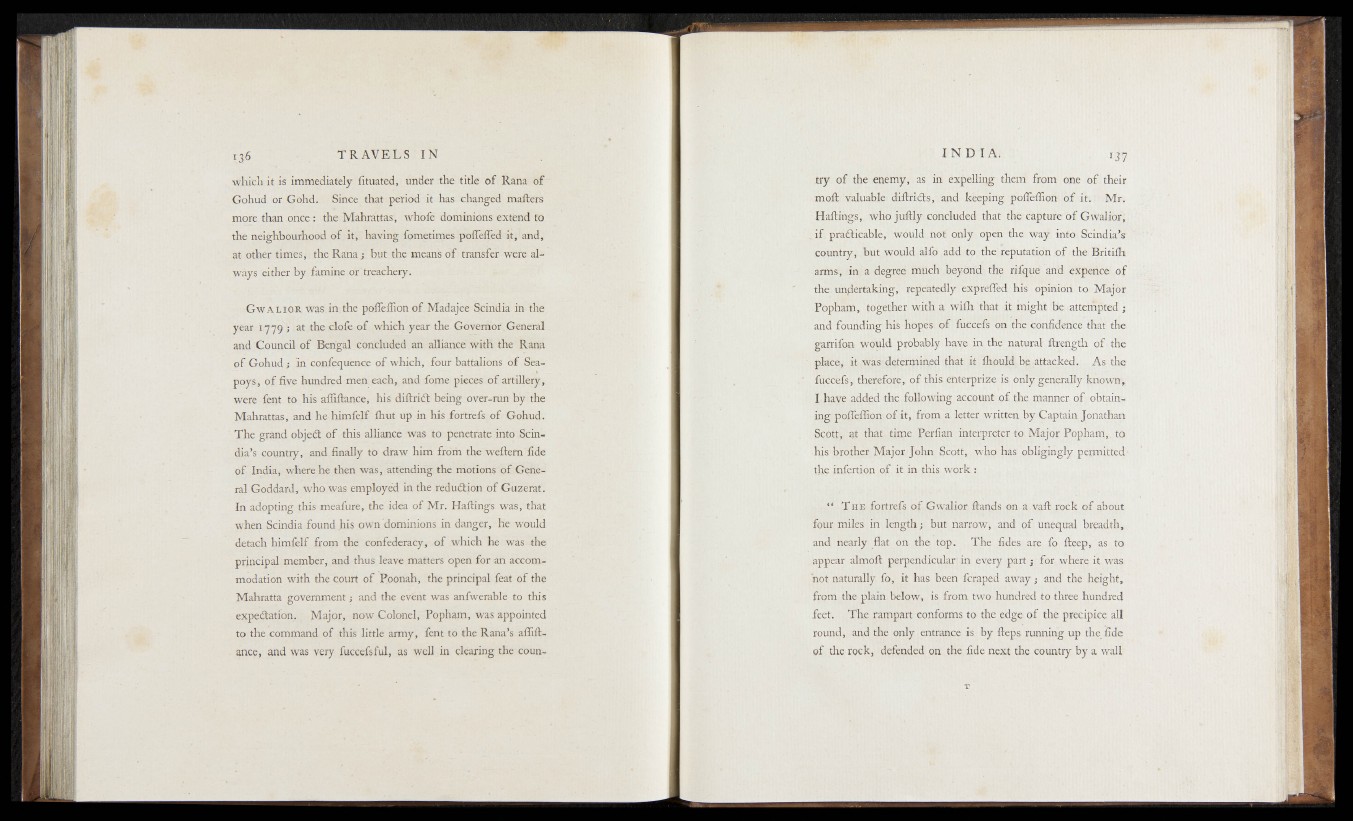
which it is immediately ffituated, under the tide of Rana of
Gohud or Gohd. . Since that period it has changed matters
more than once: the Mahrattas', whofe dominions extend to
the neighbourhood of it, having fometimes .poflefled it,'and,
at- other times/ the Rana; but the means of transfer were al-
ways either by, famine or treachery.
Gwalior was. in.the pofleffion o f Madajee Scindia in the
year i 779 r at the clofe of which year the Governor.General
and Council of Bengal concluded an alliance with the Rana
of Gohud ; in confequence of which, four battalions of S'ea-
poys, of five hundred men each, and fome pieces, of artillery,
were fent to his affiftanc©, his diftridt being over-run by,the
Mahrattas, and he himfelf Ihut up in his fortrefs of Gohud.
The grand objedt of this alliance was to penetrate into .Scin-
dia’s country, and .finally to draw him from the weftefn fide
of. India, where he then was, attending the motions of General
Goddard/ who was employed in the reduction Of Guzeraf.
In adopting this meafure, the idea of Mr. Haftings was, that
when Scindia found his own dominions in danger, he would
detach himfelf from the confederacy, of which Tie was the
principal member, and thus leave matters open for an accommodation
with the court of Roonah, the principal feat of the
Mahratta government; and the event was anfwerable to this
expe<ttation. Major, now Colonel, Popham, was appointed
to the command of this little army, fent to the Rana’s affift-
ance, and was very fuceefsful, as well in clearing the country
of the enemy, as in expelliqg them from one of their
moft valuable-difti&fts^ and-keeping pofleffion?'of it: Mr.
Haftings', who juftly concluded that the capture of Gwalior;
i f practicable, would not! onlyi» open the way into, Scindia?«'
country, but .would alfo.add to. the’reputation of;the Britifh
arms, in;a degree mpeh .beyond the rjfqye' and experice' of
the undertaking, repeatedly exprefled his" opinion to^Major
Popham, together' with ahwhh that it might be attempted;
and founding' ni§ Hopes o f fucceifs on the- confidence that the
garrifoa would probably have in the natural ftrength of »the
place, it was determined that it ffiouid be attacked. As the
fuccefs, therefore, of this eftterprize is only generally known,
I have added the following account of the manner of, obtain-
ing pofle.ffion' of it, from a Tetter written by Captain, Jonathan
Scott, at that, time Perfian interpreter to Major Popham,. to
his brother Major john Scott, who has1 obligingly permitted1
the infertion of it in this .work :
. “ T he fortrefs o f Gwalior ftands on a vaft rock o f about
four miles in length; but narrow, and of unequal breadth,,
and nearly, flat on the top. The fides are,, Co, fteep, as to
appear almoft perpendicular in every p a rt; for.where it.was
hot naturally fo, it has been feraped away; and the height,
from the plain below, is, from two-hundred to three hundred
feet. The rampart conforms to- the edge o f the precipice all
round, and the only entrance is by fteps running up the fide
of the rock, defended on the fide next the country by a wall
t